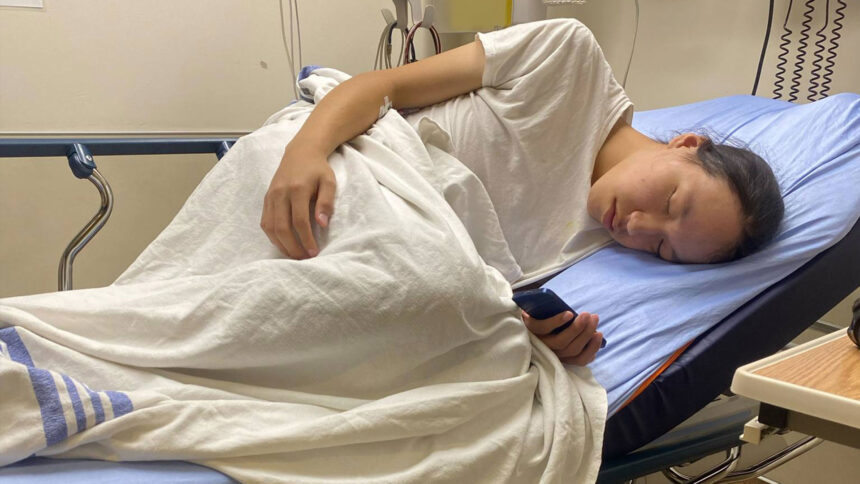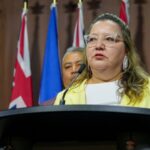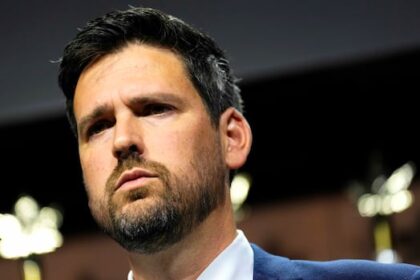The mother of 16-year-old Hanlon Thompson from Ochapowace First Nation in southeastern Saskatchewan is speaking out as Indigenous Services Canada (ISC) has repeatedly denied her son Jordan’s Principle funding for life-saving nutritional needs and other services the family needs. They were recommended by a team of doctors and specialists from Calgary’s Children’s Hospital but the family admits they are unable to pay for the diet plan and services. “If we do not take this seriously now, if we do not implement the services that (my son) desperately requires, his health will not just completely deteriorate, it will end and that is not a maybe, that is a guarantee,” said Kayla Thompson, the mother of Hanlon, speaking to APTN News from her home in Calgary. During his early teenage years, Hanlon grew up in a busy household, going to high school and playing hockey six days a week for 10 to 11 months out of the year and later helping to raise his younger brother December. Thompson fondly remembers all the trips to the rink for her son and overcoming every daily challenge life threw at them. “The early mornings and cold rinks and the long treacherous driving conditions in Saskatchewan and Alberta. I really just took our lives for granted. I thought we were living a fairytale, just me and him against the world,” added Thompson. It wasn’t until the summer of 2022 that Hanlon started to feel ill. Ochapowace First Nation teen, Hanlon Thompson with his mom, Kayla. Photo: Kayla Thompson Thompson said they started to notice something was wrong when Hanlon, who was 15 at the time, suddenly started to slow down. Hanlon’s eyes were getting puffy, he was becoming lethargic, slowly losing weight and didn’t have any energy to do basic tasks. “I thought he was just being a teenager and he was growing so I didn’t think too much about it,” added Thompson. Later in the summer and into the fall, Hanlon started to complain of having headaches and stomach pain and realized blood started to show up in his urine however Thompson said Hanlon chose to not tell her. Then in December, Hanlon decided to do a no pop or juice 100-day challenge over the Christmas break. “I didn’t understand that at the time (my son) was trying to manage his own symptoms on his own,” said Thompson. The following summer in July of 2023, Thompson planned a family trip to New York City. At the time there was a bad heat-wave and the weather conditions only exacerbated Hanlon’s condition with both Hanlon and his little brother December getting heatstroke. When they came back home, Hanlon’s condition got much worse. “He was severely anemic from urinating blood, he had no appetite. His tongue, gums and the insides of his eyes were white and the doctors did a bunch of tests on him to find out what was the cause,” added Thompson. After doctors did a biopsy of Hanlon’s kidneys and with the help of a pathologist and nephrologist at Calgary’s Children’s Hospital, doctors diagnosed Hanlon with an auto-immune condition called, IgA nephropathy, a kidney disease caused by the buildup of immunoglobulin in the kidneys that leads to inflammation and damage to the kidney’s nerve endings. “For some reason his auto-immune system turns on and never turns off so his immune system attacks his kidneys when he gets sick and adds to so many complications. The doctors say Hanlon was the perfect candidate to get it. The disease is very likely in Indigenous males and the typical onset is between 13 and 16 years of age, he was 15 at the time. It’s an unfortunate luck of genetics Hanlon got this condition,” added Thompson, who works as a fulltime nurse in Calgary. Hanlon was put on immune suppression medication via steroid injections at Calgary’s Children’s Hospital to try and suppress his immune system and ultimately protect his kidneys. However, after six grueling months of trials, Hanlon’s kidney function didn’t show any sign of improvement. Hanlon was then given a more aggressive form of immune suppression called mycophenolate, a medication that is given to organ recipients so that their body doesn’t fight their new organ transplant however because of his condition, Hanlon was not an acceptable candidate. “Personally, it’s hard to accept and I understand why ethically. He will be on the same medications for the rest of his life to protect his kidneys,” said Thompson. Hanlon Thompson was an avid hockey player before falling ill. Photo: Kayla Thompson Thompson’s younger son, December was just over a year old and needed to go to daycare so she could still work to cover all of Hanlon’s needs. Due to his medical condition, Hanlon could no longer go out in public spaces and his home needed to be professionally cleaned to keep him from catching any illnesses however Thompson says his little brother December kept catching daycare sicknesses like the common cold and hand, foot and mouth disease. When Hanlon caught these sicknesses, Thompson said he would not show any outward signs of the infection because his immune system was suppressed due to his medication. Hanlon’s sickness would run rampant in his body until it overwhelmed his system and Hanlon would then experience what’s called a flare up and immediately experience a decrease in his kidney function. “His own immune system overrode the medication that he was on and started fighting the (daycare) viruses but never shut off again and his immune system was again attacking his kidneys and causing irreversible damage to his kidneys,” said Thompson. Thompson said Hanlon’s health condition quickly weighed on her son’s mind as his life changed in an instant. “His lifestyle went from being active, to not being able to go to regular school, not being able to go home for gatherings, he’s not able to be in public spaces without precautions. He’s also not able to play hockey anymore or any kind of sports,” added Kayla. Hanlon’s doctors then came up with a very strict and specific nutrition plan with the hopes of boosting his kidneys however the price for his specific diet was at least $1200 a month. A difficult added expense to cover for Thompson, who is a single-mother raising her two boys in Calgary. Thompson also says groceries from the food bank would not have the key nutrients Hanlon desperately needed and could make Hanlon’s condition worse. “The financial means come solely from me. I was stuck between a rock and a hard place,” said Thompson. Hanlon Thompson with his teammates at a hockey practice before he got sick. Photo: Kayla Thompson On March 13, 2024, Thompson applied for Jordan’s Principle funding to try and cover Hanlon’s expensive nutrition plan ($1200 a month) and pay for December’s privatized daycare service ($150 per day) so that December wouldn’t get his older brother Hanlon sick again from daycare illnesses. She also wanted Jordan’s Principle to pay $74 dollars a month to cover parking at Calgary’s Children’s Hospital for Hanlon’s ongoing medical appointments. “Financially, it was just unreasonable for me to be able to cover these extra costs, his medication is secondary to his diet, his diet is more important and needed according to his doctors,” said Thompson. Days turned into weeks and then months of Thompson constantly calling Jordan’s Principle three times a day, every single day, to see if her son’s application would be approved for medically necessary needs. “I was so frustrated because they have a mandate to respond within 24-hours for urgent cases and this was urgent. We had doctors, surgeons, specialists, hospital social workers, First Nations leadership, all advocating for Hanlon to try and get some supports. The doctors could all see the wear and tear that was happening with Hanlon, his brother and me. Unfortunately, all of the recommendation letters didn’t do anything with Jordan’s Principle.” After many months of doctors unable to stabilize Hanlon’s health condition, Hanlon then developed a secondary autoimmune condition called Kleine-Levin Syndrome or KLS. A very rare neurologic disorder. “Essentially, it’s a sleeping and eating disorder that is controlled by an area in the brain that controls sleep and hunger regulation and some behavioral changes. Last July (2024), Hanlon went to sleep for three weeks and he was unable to do things and I would have to get him up just to drink a glass of water,” said Thompson adding that Hanlon then had another episode of hyper somnolence where he slept a lot and fell into another coma-like state for another two weeks following the first incident. “When he finally woke up, he had no memory of being in and out of sleep in the hospital. He had no hunger, no thirst, no urge to use the bathroom, all he wanted to do was sleep. Our hope was just dwindling away. His symptoms weren’t going away, we were still managing his kidneys, his diet and trying to not get anybody sick and managing Hanlon’s mental health,” said Thompson. Ochapowace First Nation mom Kayla Thompson, her baby December and big brother Hanlon. Photo: Kayla Thompson With Thompson and her children stretched thin both financially and mentally and Hanlon’s mental health taking a heavy toll, Hanlon’s doctors recommended that the family apply for a disability tax credit to help offset some of the costs. Thompson says that’s when another layer of reality set in for her son. “A year and a half prior he was playing hockey and going to high school and now his doctors are pushing for him to fill out all these disability forms. It was really tough on him, he was completely isolated, there was no mental health supports available for him at the time unless it was out of pocket and I was just so financially strapped. Hanlon felt nobody cared that he was sick,” said Thompson. Hanlon’s doctors then made another potential life changing recommendation-to surrender him to social services so that he can get the nutritional and medical support that he needs. His mother says it was a last-ditch idea by medical staff after exhausting all of their other supports. “They were just trying to think in his best interest but they had no idea the serious issue it is by giving my son to social services. We have a huge number of Indigenous children within social services that are not being cared for properly. (All of us) were in a mode of desperation,” said Thompson. Their home of Ochapowace First Nation could not help cover medical costs Thompson said, because they lived off-reserve in Calgary. She was also told by the province of Alberta that because Hanlon is Indigenous, the family should be contacting Jordan’s Principle and ISC. Last December, Thompson contacted the Human Rights Commission of Canada alleging that both Indigenous Services Canada and Jordan’s Principle’s national and Alberta offices discriminated against her son and her family for the repeated denial and deliberate delay of life-saving services for Hanlon and much needed child-care for December. “They determined that my discrimination case was valid for both children and that this delay (by Indigenous Services Canada and Jordan’s Principle) still leaves us without services and without support,” said Thompson. According to Thompson, ISC has now extended their deadline to respond to August. Meanwhile, Hanlon is still left without the help he desperately needs. “As we wait longer, my child suffers and it’s such a helpless and debilitating kind of pain to watch your baby die and that’s literally what I’m doing. No matter what I’m going through, no matter how tired I am, I look at him and I know that he’s suffering and whatever I am going through is not close to what he’s going through,” said Thompson, in tears. With their credit cards maxed, family help exhausted and Thompson having to take extra days off from work to support Hanlon, the family has created a GoFundMe to try and fundraise $40,000 to help offset some of the family’s debt. An Ochapowace First Nation mother has filed a complaint against Indigenous Services Canada for denying her son Jordan’s Principle funding. Photo: Kayla Thompson In a statement to APTN, Indigenous Services Canada (ISC) said it cannot comment on individual Jordan’s Principle (JP) requests due to its privacy policies. ISC said each JP request is considered on a case-by-case basis, along with the required documentation for the request while considering the distinct needs of the child and gaps in other programs and services. Jacinthe Goulet, Media Relations for ISC added, “JP was created to ensure that First Nations children do not experience gaps or delays in accessing government-funded health, social and education services and that they are not denied these services due to their identity as First Nations children. It is not intended to replace provincial or territorial responsibilities.” ISC noted that as of March 2025, nearly $10 billion dollars has been invested to meet the needs of First Nations children through JP and JP continues to be funded in the fiscal year of 2025-26. Since JP was first implemented in 2016, JP requests have grown at an extremely fast pace, ISC says most notably in the last few years. ISC said 614,350 products, services and supports were approved in 2021-2022 compared to almost 3 million in 2023-2024, a 367 percent increase. ISC said the federal government is now trying to find new ways to process requests to expedite decision-making and address the increased demand. Read more: Gazan, Idlout call for emergency debate in House of Commons on Jordan’s Principle Feds cut Jordan’s Principle funding to autistic First Nations child in Thunder Bay Brittany Mathews, director of reconciliation and strategic policy with the First Nations Caring Society (FNCS) in Ottawa said “it’s very concerning” ISC is “overriding” the professional treatment plans of Thompson’s child’s needs and ultimately delaying the help they desperately need which could potentially cause more harm to the family. “This is exactly what Jordan’s Principle is here for, its here to address the needs of kids, particularly very vulnerable kids with high needs. ISC has to be extremely cautious in overriding professional treatment plans from doctors. ISC does not have the clinical expertise to be overriding recommendations like that,” added Mathews, who said ISC and JP’s offices are currently in a crisis situation regarding the backlog of JP cases from last summer. Mathews said as of March 7, 2025, Jordan’s Principle had 135,000 requests for service and believes that is one of the reasons why ISC did not respond to Kayla’s request sooner. “It is not clear to the Caring Society what methods they are taking to immediately address that backlog if any,” said Mathews. Mathews also said the federal government has now subjected its JP approvals to what she calls a, “very nebulous test called, substantive equality,” and Mathews said ISC has not been clear on how its addressing and testing those requests under the new guidelines. “So that is the reason why we are seeing so many denials right across the board,” added Mathews. “Yesterday should have been when all JP funding has been restored. We’re talking about kids and they cannot wait and what we’re hearing from Canada is that they are looking to ensure the long-term health of Jordan’s Principle but they have been really thin on the details of what that actually means,” said Mathews. FNCS says it is still seeing many denials of JP requests, JP funding frozen, unclear guidelines being issued to families and no quality control to address the backlog. Mathews also said ISC is to blame when ISC staff told JP recipients last summer to “spend, spend, spend” and recipients were informed that JP funding would be restored the following fiscal year. “ISC said there may have been overspending well that’s ISC’s responsibility. They are the ones who are legally responsible for the full implementation of Jordan’s Principle and they are also the ones who have complete control over approving and denying requests of Jordan’s Principle. So, they have to look inwards,” said Mathews adding that ISC should be improving its quality control and shoring up its own federal programs. “This is a mom who is doing the absolute best for her kids and trying to make sure that they are safe and well and we should really be uplifting and honoring those families. (Kayla) is also holding Canada accountable and that takes an incredible amount of courage and strength so I commend her and hold her up,” added Mathews. Continue Reading
Mother says son is running out of time while family repeatedly denied by Jordans Principle

Leave a Comment










